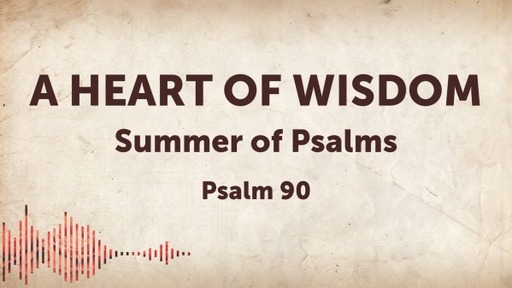A Heart of Wisdom

Notes
Transcript
The placing of this Psalm of Moses seems to be intentional. Book 3 talks and prays to be taken out of exile and back “home”. The nation wants to go back to the way things were prior to their current situation. Book 4 becomes the response to those prayers, starting with a call to go even further back than their desire.
The struggle of unworthiness.
The struggle of unworthiness.
Self-worth, feeling lovable, and having a sense that someone loves and values us is a common struggle of the human race. Through in a picture of God as out to get me or waiting for me to mess up and we see why many “feel” and think God doesn’t love them. We are unworthy!
Though there is a sense in which this is true we must not leave ourselves and others in this sense of being unworthy and unlovable.
What will the church become?
What will the church become?
This is similar to what the original hearers as they asked “what has the nation become”.
Our first call: to be a man/woman of God.
Our first call: to be a man/woman of God.
This is tucked into the meaning of the title, “Moses the man of God”. This permeates and is a thread, though unspoken, in the whole Psalm.
Life is brief and fleeting.
Life is brief and fleeting.
Our time on Earth is short by many standards. We are not immortal in the sense of going to be always alive on this world. Our bodies are finite, meaning they break down.
We need God to teach us wisdom.
We need God to teach us wisdom.
This is directly tied to whether or not we have a sense of mortality and brevity of life.
Numbering our days should help us rightly prioritize our few days we have.
Wisdom is connected to submitting to God.
Wisdom is connected to submitting to God.
This is part of the point of the Torah/Law. Wisdom is similar to freedom in the idea it is not wise to do just whatever we want. Wisdom realizes we are not the ones in charge. See the beginning verses.
God is immortal.
God is immortal.
We use other words: eternal, everlasting. God does not age.
God is outside time.
God is outside time.
Time as we know it does not mean the same thing to God. Like the author of a book is outside the “time” of the book so is God to our world.
We need God’s mercy.
We need God’s mercy.
This is reminiscent of Exodus 34.6-7 when God’s goodness passes in front of Moses. Is this why later Moses would pray on behalf of the nation?
God is moved by our actions.
God is moved by our actions.
This works in every way. The Psalmist pictures God being angry in response to sin. The nation is in exile because God was moved by the unfaithfulness and sin of the nation to do what he promised he would do.
Yet, Moses in this Psalm also calls on God to “relent/turn” from his is anger and show again his compassion.
Sin moves God.
Sin moves God.
This is his righteous anger and discipline. We may be able to hide our sins from others but God knows all.
Prayer moves God.
Prayer moves God.
Moses, Abraham, Elijah and others have done this. The life of Christ is filled with people asking for healing and it happening because they asked.
The NIV Application Commentary: Psalms, Volume 2 Bridging Contexts
we pray boldly because we pray to a God who, because of his grace and mercy, changes our experience.
Let Christ give you love.
Let Christ give you love.
Christ loves you more than you will ever know.
Let Christ give you purpose.
Let Christ give you purpose.
This is the offer of Jesus in John 10.10
The thief comes only to steal and kill and destroy; I have come that they may have life, and have it to the full.
The question is will you accept it and take it?
Let God be your dwelling place and refuge.
Let God be your dwelling place and refuge.
Bad things will happen to good people. Because we live in a broken world, which is going to be redeemed one day, bad things happen. We do not always “deserve” what comes our way. However, we can choose where we “live” and dwell.
